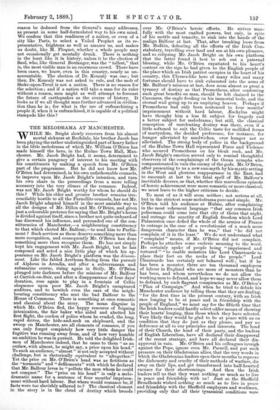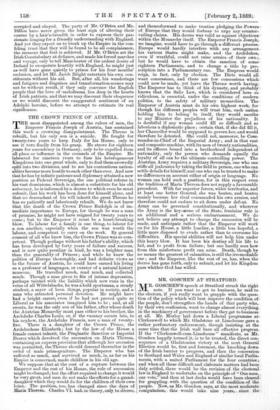LliE MELODRAMA AT MANCHESTER.
WHILE Mr. Bright slowly recovers from his almost mortal sickness at Rochdale, his brother Jacob has been playing the rather undistinguished part of heavy father in the little melodrama of which Mr. William O'Brien has made himself the hero, in the Hulme Town Hall, Man- chester. Mr. Jacob Bright had, it seems, determined to give a certain pungency of interest to his meeting with his constituents by making a speech from Mr. O'Brien part of the programme. But he did. not know how Mr. O'Brien had determined, in his own unfathomable counsels, to improve upon Mr. Jacob Bright's intention, and turn his own share in the proceedings from a mere telling accessory into the very climax of the romance. Indeed, was not Mr. Jacob Bright worthy for whom he should do this ? While his elder and greater brother remains irre- concilably hostile to all the Parnellite counsels, has not Mr. Jacob Bright adapted himself in the most amiable way to all the designs of Mr. Dillon and Mr. O'Brien, and given just a colourable pretence for saying that Mr. Bright's house is divided against itself, since a brother not quite unheard-of has disowned his influence, and persuaded. one of the con- stituencies of Manchester,—a neighbouring constituency to that which elected Mr. Balfour,—to send him to Parlia- ment? Such services as these deserve something more than mere recognition, and consequently Mr. O'Brien has done something more than recognise them. He has not simply kept his engagement with Mr. Jacob Bright, but he has composed and acted a nice little play of which his ap- pearance on Mr. Jacob Bright's platform was the elbzoue- ment. Like the fabled Arethusa fleeing from the pursuit of Alpheus in Arcadia, and after a subterranean and submarine course, rising again in Sicily, Mr. O'Brien plunged into darkness before the minions of Mr. Balfour at Carrick-on-Suir, and after a disappearance of four days' duration, rose again to play in a fountain of Celtic eloquence upon poor Mr. Jacob Bright's enraptured auditors, and to bewitch even the ears of the neigh- bouring constituency who sent the bad Balfour to the House of Commons. There is something at once romantic and classical about the story. The mean disguise in which Mr. O'Brien fled, the happy resource of feigning intoxication, the fair baker who aided and abetted his first flight, the cordon of police whom he evaded, the long, rapid drives, the hide-and-seek on shipboard, and the swoop on Manchester, are all elements of romance, if you can only forget completely how very little danger the fugitive was running away from, and of how very humble an ambition he was in pursuit. He told the delighted Irish- men of Manchester indeed, that he came to them "as an outlaw, with almost, he might say, a price upon his head." To such an audience, " almost " is not only accepted without challenge, but is rhetorically equivalent to "altogether." Yet the price on Mr. O'Brien's head was as fictitious as the "torments" and "defilements" with which he declared that Mr. Balfour loves to "pollute the men whom he could not conquer." The "price on his head" is only a melo- dramatic name for a sentence of four months' imprison- ment without hard labour. But where would romance be, if facts were too slavishly adhered to ? The classical element in the story is in the cloud of destiny which broods over Mr. O'Brien's heroic efforts. He strives man- fully with the most exalted powers, but only, in spite of his mettle and tenacity, to sink into the hands of the malign Balfour at last. That, after breaking loose from Mr. Bodkin, defeating all the efforts of the Irish Con- stabulary, travelling over land and sea at his own pleasure, and so eclipsing Mr. Jacob Bright on his own platform that the latter found it best to sob out a paternal blessing, while Mr. O'Brien expatiated to his heart's content on the sign he had given to the English people of the place which an Irish patriot occupies in the heart of his country, this Ulysses-like hero of many wiles and many fortunes should have to sink exhausted into the arms of Mr. Balfour's minions at last, does seem almost as great a tyranny of destiny as that Prometheus, after conferring such great benefits on man, should be left chained to the Caucasus, the eagle feeding on his immortal body, and the eternal wail going up to an unpitying heaven. Perhaps if Prometheus had only been sentenced to four months' imprisonment without hard labour, 2Eschylus might have thought him a less fit subject for tragedy and a better subject for melodrama ; but still, the classical conception of unrelenting destiny was there, even if a little softened to suit the Celtic taste for mollified forms of martyrdom, the decided preference, for instance, for hunger alleviated by sandwiches, over hunger not so alleviated. The strong body of police in the background of the Hulme Town Hall represented Force and Violence who secured Prometheus on his bleak rock, and Mr. Jacob Bright's emotion served only to remind thoughtful observers of the complainings of the Ocean nymphs who compassionated in vain the enemy of the gods. Mr. O'Brien, after presenting to us a new sun-myth by his mystic setting in the West and glorious reappearance in the East, had to succumb at last to the fatal spell of Mr. Balfour's inevitable decrees, so that, whether this marvellous episode of heroic achievement were more romantic or more classical, we must leave to the higher criticism to decide.
To most of us it will seem neither ; not serious at all, but in the strictest sense melodrama pure and simple. Mr. O'Brien told. his audience at Hulme, after complaining in the most vehement language "that any common Irish policeman could come into that city of theirs that night, and outrage the sanctity of English freedom which Lord Palmerston once defied the whole of the armies of France to outrage in the case of a revolutionist of a much more dangerous character than he was," that "he did not complain of it in the least." We do not understand what " complaint " means, if Mr. O'Brien did not complain. Perhaps he attaches some esoteric meaning to the word. He certainly spoke of people being "imprisoned and tortured" "to enable monsters like Lord Clanricarde to place their feet on the necks of the people." Lord Clanricarde has certainly not behaved well ; but if he has been a monster, there are ten thousand, employers of labour in England who are more of monsters than he has been, and whom nevertheless we do not allow the working men to defraud, and hope we may never allow them to defraud, by such flagrant conspiracies as Mr. O'Brien's "Plan of Campaign.' And when he tried to delude his Manchester audience by telling them that they are dealing, "for the first time in the present century, with an Irish race longing to be at peace and in friendship with the people of England," we must say for the fiftieth time that the Irish leaders could hardly select odder means of showing their hearts' longing, than those which they have selected. Very likely they would be glad to be at peace with us on condition that they do just as they please, and pay no deference at all to our pnnciples and interests. The head of their Church, the head of their party, and the leaders of English Liberalism, have all declared their disapproval of the recent strategy, and have all declared their dis- approval in vain. Mr. O'Brien and his colleagues inveigh against the Pope, ignore even Mr. Parnell, and put such pressure on their Gladstonian allies, that the very words in which the Gladstonia,n leaders open their mouths to reprove the dishonesty and cruelty of their methods of warfare, die away on their lips, and get transformed into half-hearted excuses for their shortcomings. And then the Irish leaders tell us that they want nothing so much as to live in peace and friendship with us ! Just so the Sheffield Broadheads wished nothing so much as to live in peace ' and friendship with the Sheffield employers and workmen, providing only that all their tyrannical conditions were accepted and obeyed. The party of Mr. O'Brien and Mr. Dillon have never given the least sign of altering their course by a hair's-breadth in order to express their pas- sionate longing for a friendly understanding with England. And yet they expect us, te break up the Empire in the con- fiding trust that they will be found to be all complaisance, the moment that feat is achieved. If Mr. O'Brien set the Irish Constabulary at defiance, and made his forced marches and voyage, only to tell Manchester of the ardent desire of Ireland to co-operate heartily with,England, he might just as;well have gone. quietly. to prison for his four months' seclusion, and let Mr. Jacob Bright 'entertain- his own con- stituents without his aid. But,.after all, his. wanderings and fatigues and disguises and transformation-scenes may not be without result, if they only convince the English people that the love of melodrama lies deep in the hearts of Irish patriots, and that we may discount their eloquence as. we would discount the exaggerated. sentiment of an Adelphi heroine, before we attempt to estimate its real significance..



































 Previous page
Previous page